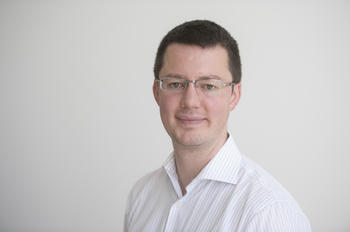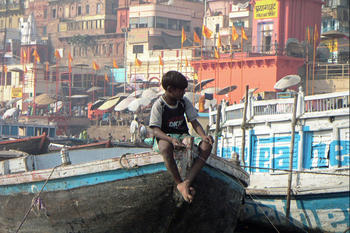A Society Experiencing Rapid Change
Political scientist Stefan Diederich is in charge of the liaison office of Freie Universität in New Delhi, India
Mar 17, 2017
Stefan Diederich is in charge of the liaison office of Freie Universität in New Delhi since 2016.
Image Credit: Bernd Wannenmacher
In the coming years India could become the world’s most populous country.
Image Credit: Ulrich Podewils
A network of seven liaison offices all over the world maintains and expands the international contacts of Freie Universität. Stefan Diederich, an expert on India with a doctorate in political science, has been the head of the office in New Delhi since last June. Thanks in part to funding from the German Academic Exchange Service (DAAD), he is able to further expand and develop the cooperation between Freie Universität and two top universities in India.
“Just a few years from now, India will be the world’s most populous country,” Stefan Diederich says. Now 32, he has been fascinated by India since he was a student studying the politics and history of South Asia at Heidelberg University. Diederich has visited India almost every year since 2005, and he wrote his dissertation on the Indian Land Acquisition Act of 1894. In June 2016, he took on the position as head of the liaison office of Freie Universität in New Delhi, which opened in 2008 and is located in the German House in the diplomatic enclave of Chanakyapuri as a member of the German House of Research and Innovation (DWIH). He finds living in the Indian capital very exciting. “The Indian economy and society are changing at a pace that would be wholly unfamiliar to people from Central Europe,” he says. “I’m thrilled to experience this development as it happens every day.”
Further Partners for Cooperation
Diederich has traveled to various areas of the country for his work over the last few months. He says living in India is intense. He has gotten used to the hot weather and chaotic traffic by now, but everyday life still comes with surprises. “People don’t adhere to rules as rigidly here as they do in Germany, and you have to improvise on an ongoing basis,” Diederich explains.
Together with his colleague Sanju Kumari, Diederich represents Freie Universität Berlin at higher education fairs and stays in touch with the eight universities in India with which Freie Universität has entered into formal cooperative relationships. The number of Indian partner organizations is rising: As part of the Indo-German Partnerships in Higher Education, Freie Universität received additional funding from the German Academic Exchange Service (DAAD) last year to intensify its cooperation with Jawaharlal Nehru University, in Delhi, and the Indian Institute of Technology Bombay, in Mumbai – two of India’s most prestigious universities. The goal of the cooperation is to allow students and researchers from Freie Universität to work on long-term projects in India.
Wide Variety of Exchange Options
“As India grows more and more important both economically and politically, familiarity with India is becoming ever more important in academia and the research sector,” Diederich says. “Aside from that, there are a wealth of research questions open in India that people can take up as part of a doctorate, for example,” he adds. And cooperation with Indian partners works well, as shown by the work done by researchers from the Disaster Research Unit (DRU) at Freie Universität together with their Indian colleagues and the thriving cooperative relationships in place in the field of chemistry.
Diederich believes spending time abroad is an important experience, especially for students: Through its numerous cooperative initiatives and ties in India, Freie Universität offers a wealth of possibilities, he says. During his own study program in Heidelberg, he studied in Singapore for two semesters, participated in a summer exchange program with a British university, and completed internships in India. “You do learn a lot about the other country, of course,” he says today. “But I think this kind of change of perspectives also gives you a better understanding of your own society back home.”
This text was originally published in German on March 13, 2017, in the campus.leben online magazine by Freie Universität Berlin.


